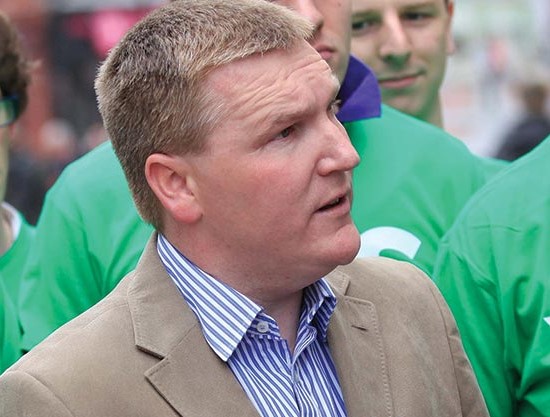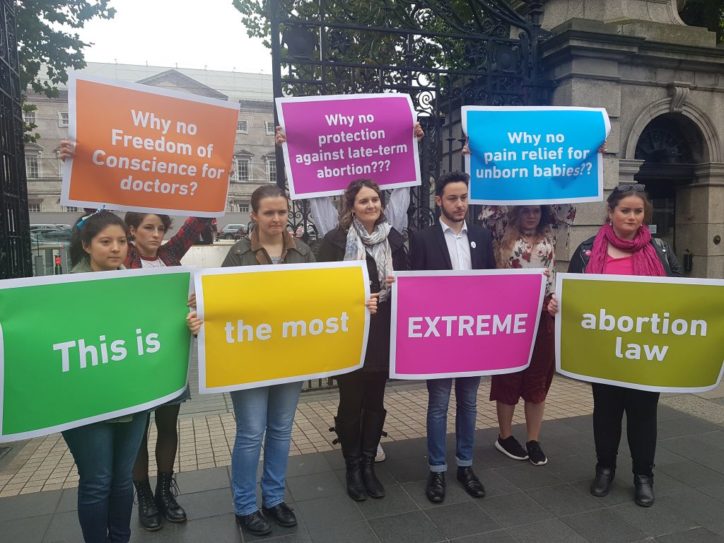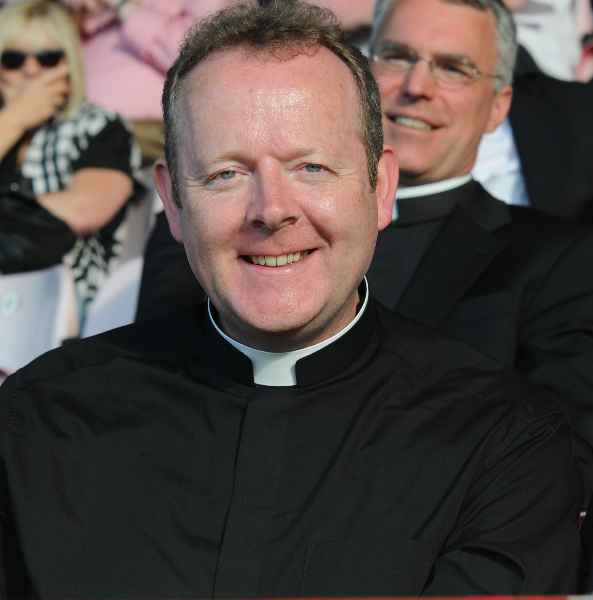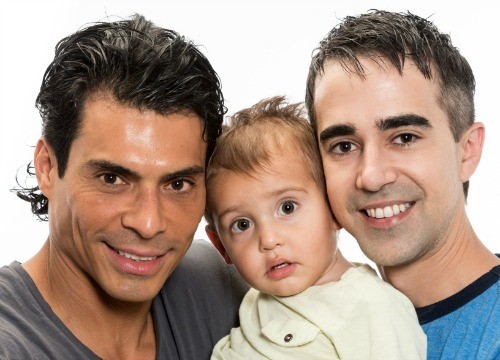
Fianna Fáil was “out of step” with the public on abortion and this damaged its chances of returning to power, one of its leading TDs has said. In an interview with the Irish Examiner, finance spokesman, Michael McGrath, said the abortion issue was an “incredibly difficult” one for Fianna Fáil, which is “scarred” by the divisions. The image of 31 of its parliamentary party posing for a photo opposing repeal of the Eighth amendment did damage the party, particularly in urban areas, he said.
The comments surprised observers who noted that the Fianna Fail party took no official position on the repeal referendum, but many of its leading figures led the charge to liberalise the country’s abortion laws. It was a Fianna Fail TD, Billy Kelleher, who first suggested that abortion should be delivered by GPs and be available without restriction for the first three months of a pregnancy.
Also, while 31 members of the parliamentary party publicly opposed repeal, that was little over half the parliamentary party of 57 TDs and senators. FF members had overwhelmingly opposed repeal at their Ard Fheis in 2017 when they passed a motion against it. Moreover, a majority of FF voters voted against Repeal according to an RTE exit poll.
In the last general election, in 2016, Fianna Fail received 24.3% of the vote, whereas 34% of the people voted against repeal of the Eighth amendment.

Pro-life campaigners sharply condemned the introduction of abortion in Ireland yesterday even as the Government hailed the new law as a “momentous” day for the country.
The day will be remembered in years to come as “the day Ireland abandoned authentic human rights, to sanction the direct and intentional killing of innocent human life”, said Dr Ruth Cullen of the Pro-Life Campaign.
She said voters were lied to every step of the way during the referendum campaign by abortion supporters. “The definition of termination of pregnancy in the new legislation says nothing about healthcare or the intervention being necessary to treat a pregnant woman. It simply defines abortion as a procedure ‘intended to end the life’ of an unborn baby. The intent here could not be clearer.”
She said the new law is built on a lie that will not make Ireland a kinder, gentler, more compassionate place as some abortion advocates suggest.
“The fact that the Dáil refused to accept amendments like providing pain relief for unborn babies during late term abortions casts an even darker shadow over this barbaric law. It is a law that doesn’t show as much as a hint of mercy for unborn babies.”
Nonetheless, Dr Cullen vowed to fight on “to expose the lies that were told during the referendum campaign and we look forward to a brighter day at some point in the future when unborn babies in Ireland will once again be welcomed in life and protected in law”.

The new abortion law has “no moral force” and has “to be resisted”, the Catholic Archbishop of Armagh has said.
In his New Year message, Archbishop Eamon Martin said despite the repeal of the Eighth Amendment “it remains no less true that the life of a woman and her unborn baby are equally deserving of love, respect and protection”.
“Any law which suggests otherwise has no moral force,” he said.
“In good conscience it cannot be supported; it has to be resisted and we must continue to call and work diligently for its limitation, amendment and repeal.”
Dr Martin also said health staff should not be compelled to participate directly or indirectly with abortions. “No one should be forced, against their conscience, to participate in abortion or to refer patients to others for abortion,” he said.

There were at least 18 confirmed assaults against Christians in India in the run up to Christmas. The worst attack took place in Kowad village, Kolhapur District in Maharashtra state, where masked men carrying sharp weapons attacked a Christmas gathering on Dec. 23. The bloody assault sent seven Christians to hospital intensive care, with three undergoing surgery.
Around 20 masked men barged into the Sunday worship service of the New Life Fellowship Church with swords, knives, iron rods, glass bottles, stones and other sharp objects and attacked the congregation meeting at the presbyter’s residence. Milton Norenj, coordinator of the New Life Fellowship Jadhinglaj, said the suspected Hindu extremists entered the service shouting, “Jai Bhawani, Jai Shivaji,” that is, victory to Bhawani, a Hindu goddess, and victory to the historical Hindu warrior king Shivaji.
Pastor Bhimsen Ganpati Chavan, 36, said there were about 40 Christians present when the attack took place. Many were left injured and required stitches or surgery to recover.
“I have been living here since the year 2000,” Pastor Chavan told Morning Star News. “We have faced some opposition before, but never an attack of this kind.”
He said the attack lasted five to seven minutes until the terrorists left. This attack is just one of many against Christians and confirmed fears that India is becoming increasingly dangerous for believers.

Yesterday, as Christmas holidays begin, the President signed into law the abortion bill which was passed by both houses of the Oireachtas. This paves the way for abortions to begin taking place in Irish GP surgeries and hospitals by order of the Minister for Health at the start of next year.
Separately, the Medical Council deleted provisions from its ethical code which will mean that ethical guidance on performing abortions will not be in place for doctors when the legislation comes into force next month. The Council deleted those provisions from its guide on professional conduct and ethics because they conflicted with the new Abortion Act. Two of the four deleted paragraphs state that a doctor has an ethical duty to make every reasonable effort to protect the life and health of pregnant women and their unborn babies; and that in exceptional circumstances, it may be necessary to terminate the pregnancy to protect the life of the mother while making every effort to preserve the life of the baby. Another paragraph has been slightly edited to change a reference from “abortion” to “termination of pregnancy”.
No moral reasoning was used to show why ethics must conform to the law.
The decision was taken at a specially convened meeting on Wednesday night. The council is updating the ethical guide but this process will not be ready in time for the introduction of abortion services on January 1st.

The new National Maternity Hospital (NMH) will operate without any hint of a Christian ethos or any influence from the Sisters of Charity, the Minister for Health has confirmed.
The new hospital is being built on land donated by the St Vincent’s Hospital Group that was set up by the Sisters of Charity. The Sisters have announced that they are pulling out of the Group and a new company is being set up to run the hospital in their absence. The company will include members of the present NMH on Holles Street.
The Minister said the agreement would confirm the hospital’s clinical and operational independence and it would ‘unequivocally, copper-fasten the principle that patient care would be delivered without religious, ethnic or other distinction’. He said “any relevant medical procedure, which is in accordance with the laws of the land, will be carried out at the new hospital”.
The decision was welcomed by former NMH master Dr Peter Boylan, one of the staunchest opponents to any vestige of Catholic influence over the ethos of the new hospital. Dr Boylan said he was delighted there will be “no possibility of religious ethos influencing clinical care” and welcomed the revision of governance arrangements to “ensure full clinical and operational independence.”

The Department of Education is set to consider whether the law should be changed to force schools with a religious ethos to teach sexual practices and beliefs contrary to their vision of the human person.
The move comes after a report by the Oireachtas education committee proposed that the sex ed curriculum should be transformed by radical new gender theories and include information about LGBT sexual relationships.

Ten days from the introduction of abortions in some GP surgeries in Ireland, guidelines on properly administering lethal abortion drugs are still not complete. Yesterday, GPs were issued ‘interim’ guidelines by their professional body, the Irish College of General Practitioners (ICGP). The College is silent on the issue of doctors who conscientiously object to abortion having to refer women to doctors who will prescribe the abortion pill.
According to the Irish Times, the guidelines “lack detail in a number of key areas which, the document says, remain ‘in development’. These include detailed referral pathways to secondary care, details on Anti-D availability, and notification and certification forms.”
The ICGP says it has written to Minister for Health Simon Harris over its concerns at the “lack of clarity” around referral pathways to secondary care, when this is required, throughout the country.
The ICGP has been at the centre of a storm of controversy over its refusal to meet with doctors protesting the inadequate provisions for conscientious objection. There are also massive concerns over how GPs are meant to respond in cases where the abortion drugs trigger major complications for the mother.

The Irish Times has been roundly criticised for posting a headline that inaccurately claimed 75% of GPs had signed up for an abortion hotline. In fact, only 200 GPs out of 3000 had agreed to do abortions and that only 75% of those 200 agreed to their names being used in an abortion hotline.
Cora Sherlock of the Pro-life Campaign commented on twitter: ‘Shouldn’t this read “200 GPs out of approximately 3000 have signed up”. The 75% refers to that 200 which means 150 out of 3000 GPs in Ireland have signed up. So that’s 5%, not 75%. Please correct this misleading headline so it actually reflects the facts.’
The Irish Times subsequently scrubbed all trace of the original headline. However, the social media they had used to promote the article continued to have the same inaccurate headline.

Catholic and other faith school could be forced to teach children an LGBT course under recommendations from the Oireachtas Education Committee. According to The Irish Independent, a draft report calls for a radical overhaul of Relationships and Sexuality Education so that both secondary and primary school children would be taught about LGBT issues “without distinction as to their heterosexual counterparts”.
It also recommends changing legislation to ensure that even denominational schools, such as those owned by the Catholic Church, are required to teach the new programme – even though it would be against their ethos.
The report says the new RSE programme should be “fully inclusive of LGBT relationships and experiences, including sexual orientation, gender identity and the spectrums thereof”.
It adds: “Consideration should be given to the inclusion within curriculums of LGBT specific sexual health issues and the presentation of LGBT relationships without distinction as to their heterosexual counterparts.”
It also calls for the introduction of a system for recording incidences of homophobic or transphobic bullying in schools. Primary and secondary teachers would also have to provide classes on sexual consent under the reforms.
A curriculum on sex education for people with intellectual disabilities, including classes on sexuality and contraception, is also proposed.